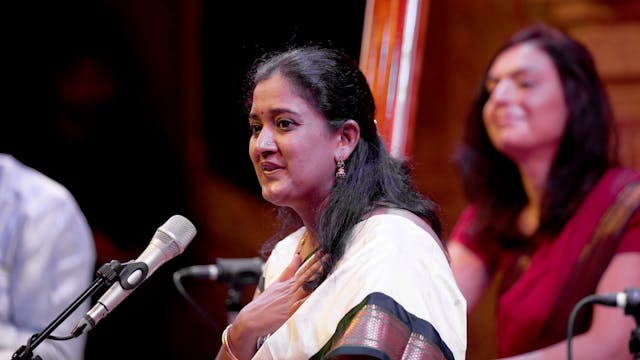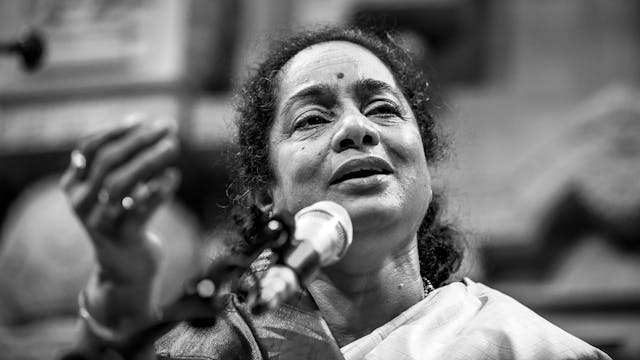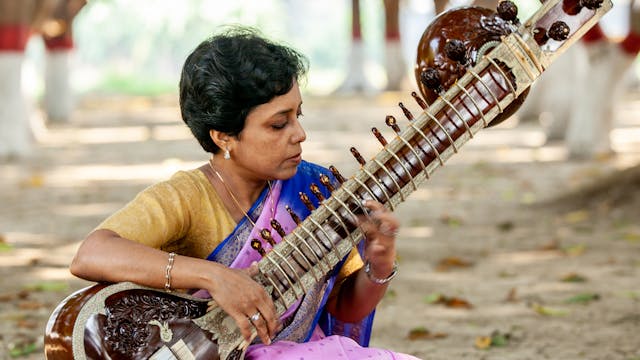Pandit Budhaditya Mukherjee | Raga Nand
Evening Ragas
•
29m
Recorded at Darbar Festival 2019, on the 13th October, at the Barbican Centre.
Musicians:
- Pandit Budhaditya Mukherjee (sitar)
- Soumen Nandy (tabla)
Raag Nand; Thaat: Kalyan; Samay: Night
Pandit Budhaditya Mukherjee bends the rules of Indian classical music in his graceful way and with expertise in this performance, only to make it more delicious to an audience asking for more. In this concert from Darbar Festival 2019, Pandit Mukherjee plays Raag Nand. This is the second piece of the 1 hour and forty-five minute long performance.
What makes it interesting is that, he plays this light melody immediately after completing an evocative recital in Darbari Kanada. He begins with a madhyalay teental composition, taking less than a minute to redefine the somber environs left behind by Darbari Kanada and creates a bright and playful ambience with Nand. Furthermore, if placed in the proper timeline of Hindustani ragas, Nand comes much before Darbari Kanada and is supposed to be played between 9 pm and 12 am. However, in the expert hands of a musicians’ musician like Pandit Mukherjee, ragas bloom irrespective of time and place and Nand traveled straight into his audiences’ hearts.
Soumen Nandy offers a brilliant accompaniment, keeping in line with the refined phraseology of Pandit Mukherjee. Without making prolonged entries or exits, he deploys tukdas getting straight to the point and respectful of the melodic wholesomeness of the recital.
Raag Nand is a derivative of the Kalyan thaat. It uses both teevra (sharp) and shudh (pure) Ma (4th) with rest of the notes being pure. Nand is also known as Anandi Kalyan. This raga was conceived in the earlier 20th century, some say by Mehboob Khan, who was the father-in-law of Faiyyaz Khan of the Agra gharana. It became famous through Alladiya Khan, the creator of the Jaipur Atrauli gharana, who had picked it up from Mehboob Khan and developed it further. According to musicologist Rajan Parrikar, “This raga is a product of the highest musical imagination, a masterful synthesis of melodic calculation and aesthetic imperatives. The contours of Raag Nand do not obtain from simple, linear arohi or avarohi taans. There are tantalizing chhayas (shades) of 3 or 4 ragas but it has an independent personality all of its own.”
Pandit Budhaditya Mukherjee
Pandit Budhaditya Mukherjee is one of the leading sitar players of India who has trained under his illustrious father, Late Pandit Bimalendu Mukherjee in the Imdadkhani gharana. Through the tonal clarity of his sitar, the depth of his alaap and the intricate taankari, Pandit Mukherjee has established time and again, his mastery over the instrument as well as his adherence to the strictly gayaki style (vocal music and its ornamentations) of the Imdadkhani gharana. He has a brilliant academic record – as a young student barely in his twenties, he secured a Gold Medal in Metallurgical Engineering. However, music had occupied the greater part of his heart; That Pandit Mukherjee had picked up the sitar instead of a job offer letter, is in itself an achievement of Indian classical music and the community as a whole
Nandy has trained in the Farrukhabad style under Pandit Pankaj Chatterjee and then under Pandit Arup Chattopadhyay in Kolkata, India. The Farrukhabad school of tabla, being one of the oldest and the most prominent gharanas in north Indian classical music, dates back to the 11th century.
Up Next in Evening Ragas
-
S5 EP3 | Manjiri Asnare-Kelkar
Recorded at Darbar Festival 2012, on 28th September, at the Southbank Centre, London.
Musicians:
- Manjiri Asanare-Kelkar (vocal)
- Vishwanath Shirodkar (tabla)
- Tanmay Deochake (harmonium)
- Priya Parkash (tanpura)
- Shobhana Patel (tanpura)Raag Raisa Kanada; Thaat: Kafi; Samay: Evening...
-
Shruti Sadolikar | Raag Bihari
Recorded at Darbar Festival 2012, on 29th September, at the Southbank Centre, London.
Musicians:
- Shruti Sadolikar (Jaipur-Atrauli gharana)
- Vishwanath Shirodker (tabla)
- Murad Ali (sarangi)
- Tanmay Deochake (harmonium)
- Ranjana Ghatak & Shobana Patel (tanpuras)Raag Bihari, Thaat...
-
Mita Nag | Raag Suha Kanada
Recorded on location in Singur, West Bengal, India.
Musician:
- Mita NagRaag Suha Kanada; Thaat: Kafi; Samay: Late Morning
Filmed on location at Singur, West Bengal, Mita Nag performs Suha Kanada. Nag is the sixth generation of sitarists in her family - a lineage including Manilal Nag (her fa...



